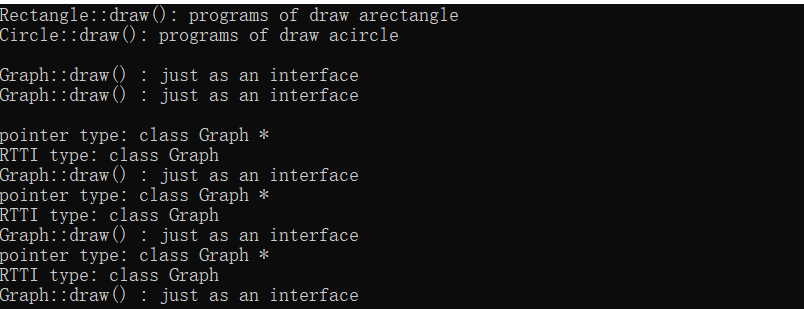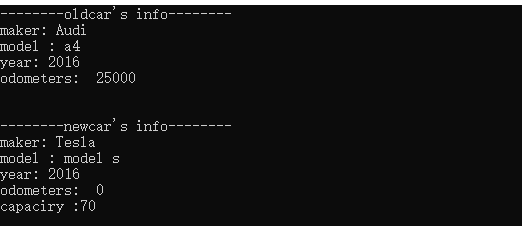实验四--类和继承
实验结果:
实验2代码
#include <iostream> #include <typeinfo> // definitation of Graph class Graph { public: void draw() { std::cout << "Graph::draw() : just as an interface\n"; } }; // definition of Rectangle, derived from Graph class Rectangle : public Graph { public: void draw() { std::cout << "Rectangle::draw(): programs of draw arectangle\n"; } }; // definition of Circle, derived from Graph class Circle : public Graph { public: void draw() { std::cout << "Circle::draw(): programs of draw acircle\n"; } }; // definitaion of fun(): as a call interface void fun(Graph* ptr) { std::cout << "pointer type: " << typeid(ptr).name() << "\n"; std::cout << "RTTI type: " << typeid(*ptr).name() << "\n"; ptr->draw(); } // test int main() { Graph g1; Rectangle r1; Circle c1; // call by object name g1.draw(); r1.draw(); c1.draw(); std::cout << "\n"; // call by object name, and using the scope resolution operator:: r1.Graph::draw(); c1.Graph::draw(); std::cout << "\n"; // call by pointer to Base class fun(&g1); fun(&r1); fun(&c1); }
未调试的结果

将基类函数改为虚函数之后的结果

调用函数的时候,不再静态调用基类的函数,而是根据指针指向的内容来决定使用的那一部分的函数,如图,在调用draw()时候分别调用的两个子类的函数
实验3代码
#include <iostream>
#include <typeinfo>
#include <cstring>
using namespace std;
class Battery
{
private:
double capacity;
public:
Battery(const double a) { capacity = a; }
double get_cacity()
{
return capacity;
}
};
class Car
{
private:
string maker;
string model;
int year;
double odometers;
public:
Car() {};
Car(const string a, const string b, const int c, const double d = 0) :maker(a), model(b), year(c), odometers(d) {};
virtual void info() {
cout << "maker: " << maker << endl << "model : " << model << endl <<
"year: " << year << endl << "odometers: " << odometers << endl;
}
void update_odometers(double miles)
{
if (miles < odometers)
{
cout << "typed wrong, please type again!";
int temp;
cin >> temp;
update_odometers(temp);
}
else
{
odometers = miles;
}
}
};
class ElectricCar : public Car
{
private:
Battery battery;
string maker;
string model;
int year;
double odometers;
public:
ElectricCar(const string a, const string b, int c, double capacity = 70):maker(a),model(b),year(c), battery(capacity),odometers(0) {};
void info() {
cout << "maker: " << maker << endl << "model : " << model << endl <<
"year: " << year << endl << "odometers: " << odometers << endl;
cout << "capaciry :" << battery.get_cacity() << endl;
}
};
实验3测试结果:

实验四代码:
#include <iostream> #include <typeinfo> #include <cstring> using namespace std; class MachinePets { private: string nickname; public: MachinePets(string a = "二狗子"): nickname(a) {}; virtual string talk() { // write the type of talks here. return "blanked"; } string get_nickname() { return nickname; } }; class PetCats : public MachinePets { public: PetCats(const string a) :MachinePets(a) {}; string talk() { return "Yes!"; } }; class PetDogs : public MachinePets { public: PetDogs(const string a) : MachinePets(a) {}; string talk() { return "Oh!"; } };
实验四测试结果:

实验总结:
类继承是面对对象编程当中的一个相当重要的环节,通过定义类继承,可以是代码更简洁,并且能够体现各个类之间的关系。
代码方面:
1、多态:通过定义虚函数,可以是编译器不会在编译过程当中过早的绑定函数,而是根据传递过来的指针来决定调用的是哪里的函数,从而使得函数更灵活,注意编写的时候虚函数的格式必须要和对应函数是一致的或者在c++当中属于无损失转化的同类。
2、类继承当中,可以继承父类的各种函数接口,但是不能通过非共有接口的方式访问私有成员,因此在编写继承类的构造函数时需要注意。
3、派生类无法继承父类的运算符重载以及友元函数



 浙公网安备 33010602011771号
浙公网安备 33010602011771号